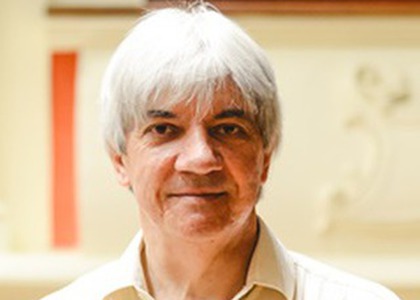> [Archived] Interviews

Interview with conductor Gheorghe Costin
During this period, International New Music Week takes place, a manifestation that reached its 32nd edition this year. In this context, tomorrow, May 24th, the Radio Chamber Orchestra will perform a concert under the baton of Gheorghe Costin. We learn more information from the conductor in a dialogue with Ioana Țintea.
You are a constant presence in the events of International New Music Week, which reached its 32nd edition this year. You studied composition in parallel with conducting and are a member of the Union of Composers and Musicologists from Romania. From this perspective, how would you describe the course of this festival over all these years?
I recall with great pleasure the 2nd edition of this festival, in 1992, when together with the National Radio Orchestra and the Antifonia Choir from Cluj we created an Iannis Xenakis medallion, in the presence of the composer. He had then turned 70 and it was a concert event. It was all the cream of the composers from Romania at that concert and the National Orchestra played absolutely superbly, and the choristers from the Antifonia were absolutely sublime. I have been invited to other editions, either with the National Orchestra, I remember, in 2019, or with the Chamber Orchestra, ten years ago, nine years, eight years ago, I have indeed been to several editions of this international festival.
How can we discover the beauty of this new music? Does it happen naturally or does it need some education?
I think there needs to be an education on this. Some things go naturally, but anyway, the basis is the study and "entering" the score, knowing the musical scores very well, because they are really difficult.
Returning to the concert on May 24th, what are the challenges of presenting works in the absolute first audition, such as Floraison for orchestra by Cornel Țăranu and Passaccona Helix for piano and chamber orchestra by Cătălin Crețu?
They are very good works. I already studied these scores three or four months ago and they are very well written for the orchestra. Maestro Țăranu's work is Floraison, it is indeed a work written in sonata form. I spoke with the author and he told me a few words, and this Floraison comes from a lot of Gustav Mahler, he used in his symphonies this term of budding in music and the work of Cătălin Crețu, which is a work for piano and orchestra. We have the pianist Horia Maxim as a soloist, a variational work, a theme with 11 variations and a coda, in which, as the title says, Passacaglia is combined with Ciacona. Helix comes from the Latin for spiral, so it's a variational form as you said, but everything spirals.
The program is completed by the concerto for flute and string orchestra, Umbre si Genese by Viorel Munteanu and the 7th Symphony by Sorin Lerescu. What is the thread that connects this program?
In the last row there are works written in the last five years and it is a fusion of styles from this period, the period 2017-2022. The works are diverse, yet there is unity in this presentation. Sorin Lerescu's work, I remember with pleasure that I conducted it in Timișoara, even on Romania's National Day, on December 1 last year, and a work that the audience liked. I hope they like all the programs we do, and that they are embraced by the public.
What thoughts should the audience come to a new music concert with?
As I have said on other occasions, the Bucharest public is used to this style of music. I think they know how to appreciate it very well at its true value.
What are your thoughts on the collaboration with pianist Horia Maxim and flutist Ion Bogdan Ștefănescu?
I haven't had the opportunity to collaborate with either of these two outstanding soloists yet. I have known the flutist Ionuț Bogdan Ștefănescu for many years. Together with Horia Maxim now will be my first appearance on the stage and I will gladly accept this collaboration.
Translated by Georgiana-Carmen Rădulescu,
University of Bucharest, Faculty of Foreign Languages and Literatures, MTTLC, year II
Corrected by Silvia Petrescu














